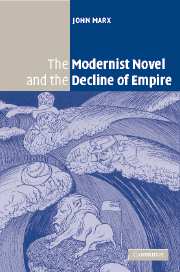1 - Conrad's gout
Published online by Cambridge University Press: 22 September 2009
Summary
They are the same words that the Bourgeois reads every morning – the very same! But then … if he finds them again in one of my poems he no longer understands them! That's because they have been rewritten by a poet.
Attributed to Stéphane MallarméWhat has driven [me] into the bush … is the usual thing … I have moved outside … Outside I am freer.
Wyndham LewisModernists write from the margins. No less an authority than T. S. Eliot decreed that every writer ‘should, to some extent, be able to look upon, and mix with, all classes as an outsider’ (‘Place’ 244). Eliot offered this prescription in the 1940s, and it has since become so habitual in criticism that one may scarcely discover any modernist occupying other than what Michael Levenson calls an ‘ambiguous position’ vis-à-vis English culture, literature, and history (Modernism 79). The most English of novelists appear to be like an ‘exile from his own culture’, while the period as a whole is incontrovertibly ‘dominated … by foreigners and expatriates’, as Terry Eagleton puts it in his 1970 work Exiles (191, 9). This axiom long ago became a global cliché. ‘We have learnt from Europe that a writer or artist lives on the fringe of society’, Chinua Achebe wrote in 1965, ‘wearing a beard and peculiar dress and generally behaving in a strange, unpredictable way’ (40–1).
- Type
- Chapter
- Information
- The Modernist Novel and the Decline of Empire , pp. 25 - 58Publisher: Cambridge University PressPrint publication year: 2005



